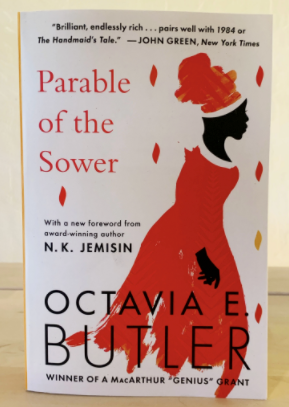Welcome to “Facing the Speculative,” where I will be discussing some crucial speculative fiction novels and their implications for modern society. This is an extension of the project “Imagining Adaptive Societies” with Earth systems associate professor Jamie Jones and political science professor Margaret Levi under the Center for Advanced Study in the Behavioral Sciences (CASBS).
Attending school at Stanford can sometimes feel unreal with the University’s endless list of opportunities and activities and relentless sunshine. Life on campus can almost feel like a simulation — though beautiful in many ways, it is an atmosphere that has enabled me to distance myself from the real world.
It wasn’t until I began to read Octavia Butler’s “Parable of the Sower” that I was struck with how far removed I was from reality. Written in 1993, “Parable of the Sower” is a speculative fiction novel set in California, year 2024. Fires, some that are caused by climate change and others that are caused by drug-hungry pyromaniacs, ravage the state. Excessive amounts of money are being spent on space exploration as it transitions to privatization. Police forces fail to help fleeing refugees, oftentimes only adding to the chaos and violence. Politicians promise a return to glory while suspending laws of employee protection, environmental regulation and economic supervision. Post-modern capitalism has evolved into a form of debt slavery, where employees live paycheck to paycheck, forever tethered to their jobs.
As I read this novel, I couldn’t help but connect the fictional plot to the very nonfiction reality we live in today. Record-setting fires are burning through California right now. Richard Branson, Elon Musk and Jeff Bezos are spending billions of dollars in this new-era space race to colonize Mars and pioneer space tourism. Wealth inequality pervades. Afghan refugees are finding themselves caught in chaos, unable to find asylum. The list simply goes on.
We’ve come to an apex of history where the fictional narratives we once regarded as “otherworldly” are in fact very worldly. They are beginning to play out in real time — right here, right now. Speculative fiction is no longer just an escape from reality; its fictional plots often bounce you back to the nonfiction plot playing out in our timeline.
But while Butler’s “Parable of the Sower” and other speculative fiction novels are driven by conflict and catastrophe, their plots are resolved by resolutions that are yet to be realized in our world. This right here is my fascination with speculative fiction. Authors are allowed to speculate resolutions that we as readers can try to implement in the real world.
In Butler’s “Parable of the Sower,” 15-year-old protagonist Lauren Olamida zealously endeavors to unearth her own religion that is illuminous of her lived experience. One of the verses of her religion “Earthseed” is: “Ignorance / Protects itself. / Ignorance / Promotes suspicion. / … / Ignorance / Protects itself, / And protected, / Ignorance grows.”
Answers to real-world problems can be found both in reality and in the fictional dimension. Lauren, and Butler by extension, are begging that we not remain ignorant to the fictional world, let alone the world that exists outside of our bubbles, for that ignorance will only flourish upon itself and grow. The most pressing solutions for problems like climate change and political injustice may be right there, at the touch of a novel.
